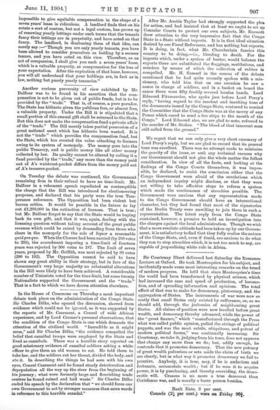Sir Courtenay Ilbert delivered last Saturday the Romanes Lecture at
Oxford. He took Montesquieu for his subject, and incidentally made some most interesting remarks on the trend of modern progress. He held that since Montesquieu's time the world had been transformed by physical science, which had increased the ease and speed of production, of locomo- tion, and of spreading information and opinions. The total effect of that was to make for democracy, plutocracy, and the aggregation of States. The instruments of war were now so costly that small States only existed by sufferance, or, as we should add, through the jealousies of neighbouring great States. All claims of position were now levelled before great wealth, and democracy thereby advanced, while the power of the "great finance," which "manufactured through the Press what was called public opinion, pulled the strings of political puppets, and was the most subtle, ubiquitous, and potent of modern political forces," was continually increasing. Sir Courtenay, we take it, judging from his tone, does not approve that change any more than we do; but, oddly enough, he contends that it promotes democracy. That the new potency of great wealth pulverises or sets aside the claim of birth we see clearly, but in what way it promotes democracy we fail to perceive. Anybody, it is true, may, if be is audacious and fortunate, accumulate wealth ; but if he uses it to acquire power, it is by purchasing, and thereby overriding, the demo- cratic will. Crassus is no more a true democrat than Coriola.nus was, and is usually a baser person besides.
Bank Rate, 3 per cent.










































 Previous page
Previous page